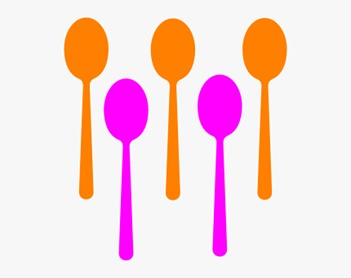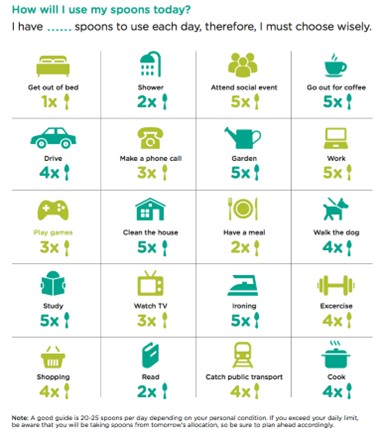Many people with chronic illness use the Spoon Theory to divide and prioritise their time and energy. However, the Spoon Theory is often not widely known beyond these communities. So, what is the Spoon Theory, and how can you use it?
The Spoon Theory is the idea that energy is a resource and must be divided and prioritised throughout the day, based on the activities that a person needs to complete. This theory has been used by many people with chronic illnesses who experience chronic fatigue and pain, to prioritise the daily activities they perform, based on their energy levels that day. Many people who use The Spoon Theory to help manage their chronic illness, and often refer to themselves as spoonies. Spoon theory has also been adopted by some members of the autistic community, as navigating day-to-day life can be exhausting.
The Spoon Theory was created by Christine Miserandino, in 2003, as a metaphor to explain to their friend how lupus affected her ability to perform daily tasks and how they had to prioritise them based on their fluctuating daily energy levels.

How does the Spoon Theory work?
As a person who experiences chronic fatigue and pain, energy levels fluctuate on a daily basis. The Spoon Theory describes these energy levels in terms of spoons, these spoons are like units of energy. For example, a person with chronic fatigue syndrome may wake up and have 12 spoons. On the other hand, the same person may wake up after a terrible nights sleep and only have 8 or 9 spoons for the following day.
These spoons are like currency. You can trade some spoons in for an activity you need to undertake. For example, brushing your teeth may cost 1 spoon. This means, on a good day, you then only have 11 spoons left. You then may need to have a shower, which then may cost 3 spoons. Therefore, before you have even eaten anything, you only have 8 spoons left. On a bad day, you may have already gotten through half your spoons just trying to get ready for the day.
If you are aware of this theory, you can manage and prioritise the tasks you perform in the day, based on your energy levels. For example, you wake up with 8 spoons and you have used 4 spoons on brushing your teeth and showering. If you have to use 3 spoons on doing university work, you may choose to order food in, or have a simple meal. This is because cooking a complex meal may cost 3 spoons, whereas having a ready meal may cost just 1 spoon. This means you have not exceeded your allotted spoons for the day. STAART uses this five minute clip of microwaveable meals in our outreach, and may benefit those who have run out of spoons to ensure they have a healthy (ish) meal: https://www.facebook.com/buzzfeedtasty/videos/2039841952935110/

An illustration showing different activities and how many spoons each activity may cost.
What happens if you go over your spoons for the day?
Sometimes, you may use more spoons than you had for the day. This means that you may have to borrow spoons from the next day. For instance, if you woke up with 12 spoons and used 14, you may borrow the extra 2 spoons from tomorrow. However, this will mean that you will have only 10 spoons for tomorrow. Thus, you will only be able to do fewer activities on that day and may need to rest more.
Borrowing spoons is something that can happen unintentionally. For example, you may have 12 spoons for the day and have used them all by lunch, but you still have lectures in the afternoon and dinner to make. These may cost an extra 5 spoons, meaning you will have to borrow them from the next day. The consequences of unintentional spoon borrowing may not be realised until the next day, when you wake up with more fatigue and pain than usual and/or may sleep more poorly.
On the other hand, some people borrow spoons intentionally. Intentional spoon borrowing may be necessary for certain events that require more spoons than you have in your day. An example of this may be travelling by plane, which may cost 12 spoons, due to the paperwork and movement involved. However, you may also need to then check in to your hotel or go straight to a conference afterwards, which cost extra spoons. Thus, in order to do these tasks, the individual may intentionally borrow spoons from the next day. In order to accommodate the lost spoons from the day after the event, many spoonies will factor in a day of rest in which they will use fewer spoons.
In my own experience of borrowing spoons, I do this when I go to concerts. I know that travelling to the concert and dancing about, and then travelling back home will more than likely cost more than my daily spoons, and so I often borrow the spoons from the day after and do fewer tasks that day. This is why I try to choose concerts that occur on Friday or Saturday. This way, I know that I will not be working or be in lectures and can conserve my energy. Melanie, the STAART Manager works three days a week due to a combination of medication, pain and fatigue and has said the following:
I recently calculated that I use 75% of my weekly spoons in my three days of working. This means I only have 25% of my weekly spoons for my remaining four days. In those four days, I have to do the washing, cleaning, shopping, cooking, days out, seeing friends, etc. As a rule, I do not even leave the house on Mondays to save up my spoons for working three days.
What happens if you borrow spoons too often?
However, borrowing spoons from the next day can be problematic. This is especially true if you have the same amount of tasks to carry out each day. If you have 12 spoons at the beginning of each day, and each day your daily tasks require 12 spoons, then borrowing spoons from the next day leaves you in a perpetual spoons debt. Over time, this debt of spoons can lead to more pain and fatigue, and exacerbation of chronic illness symptoms. This phenomenon has been coined burnout. So how do you try to avoid burnout, using the Spoon Theory? The theory suggests that allowing your body to rest where you can, and not borrowing spoons from the next day too often may avoid this.
How can you restore ‘spoons’?
The Spoon Theory suggests that sleep plays a large role in restoring spoons. Each night after sleep, spoons reset to each individual’s normal daily level; however, a poor night’s sleep can affect how many spoons are restored. For example, if your regular amount of spoons upon waking is 12, then a poor night’s sleep may leave you with 8.
Spoonies have also found that other things may help to restore spoons, apart from sleep. Some spoonies use coffee or caffeinated drinks to restore spoons. Others find that a nap or even just resting may help to restore spoons. However, these are individual experiences and do not work for everybody.
"Spoon Theory allows me to communicate my energy levels effectively with those around me. Some days I will have three coffees, then I know I’m low on spoons. Sometimes on a Friday, I will restore some of my spoons, by treating myself to a nice McFlurry.” – Brad, STAART Graduate.
All in all, it is important to remember that chronic illness, fatigue, and pain do not make us lazy. The Spoon Theory is a good metaphor in helping to understand that energy is a finite resource as a disabled person. The Spoon Theory is also a tool that can help those with chronic fatigue manage and prioritise their daily tasks with fatigue and pain in mind.
Further resources
To learn more about the Spoon Theory here are some resources:
- https://butyoudontlooksick.com/articles/written-by-christine/the-spoon-theory/ - a website written by the creator of the Spoon Theory.
- https://thespoontheory.tumblr.com/thegame - a game of examples to help understand the Spoon Theory on an individual level. Trigger Warning: Mentions of trauma and PTSD.
- *Scleroderma – information, advice and support | SRUK
Rebecca Cordina
STAART Graduate and STAART writer


